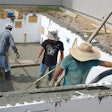
A familiar name shows up on your caller ID one morning. It’s a client with a 20,000 sq. ft. kidney-shaped pool you put in a summer ago. Maybe she’s calling about calcium deposits on the glass tile or has a question about maximizing energy efficiency on the variable-speed pump you put in. Having heard it all before, you think you’re prepared for anything she can throw your way. You pick up the phone with a smile that quickly disappears: Her pool has cracked, and she’s angry and looking for answers.
A wave of panic washes over you, and after doing your best to settle her down and get off the phone, you begin going over each step of the project in your mind — everyone who worked on it, all the subs you used — then you put in a call to your business partner, who suggests you call the insurance agent to make sure you’re covered.
If you’re lucky, your general-liability policy will contain provisions designed to protect against things just like this. (Whew! Disaster averted.) But if you are less lucky, you’ll be in for a letdown when your agent tells you about an obscure exclusion that leaves you financially liable for the damage.
One such exclusion, says Jeannette Blanton, managing director of Jeannette Blanton Insurance Agency, which is affiliated with a larger independent agency called Higginbotham, is known as a “subsidence exclusion.”
“Subsidence is Earth movement,” she says. “And pool builders should never have these subsidence exclusions in their policies.”
The idea of a subsidence exclusion in a pool builder’s policy may seem incredible, but it’s not uncommon, and there are worse ones, including complete residential exclusions.
You probably think this couldn’t happen to you. I mean, your trusted local agent — the guy who sponsors your kid’s soccer team and insures half the businesses on Main Street — wouldn’t steer you wrong by excluding acts of nature, residential work or even work done by subcontractors, would he?
Blanton, who is based in Texas but works with builders across the pool belt and beyond, says it’s not a case of indifference but rather ignorance about the ins and outs of the pool industry that leads to these avoidable claim denials.
“Really, making sure you’re covered for what you need is your agent’s responsibility,” Blanton says. “That’s what they’re there for — to act as the middle person and to make sure you have the right coverages. But what we find is that most agents don’t understand the pool industry, and so they don’t know what coverages a pool builder may need or not need, such as pop-up coverage. That’s another one builders really need, and unless you are with an insurance company that has an endorsement filed for that, they can’t even offer it.
“Small companies like ours with programs for pool builders have those endorsements, which is just another word for the forms that say what is covered and what isn’t, but the agent has to know to ask for them. The endorsements make up the policy, and you can kind of think of them like riders on a contract.”
RELATED: How to Prepare for Disaster
Blanton put together a package of endorsements for things she saw lacking among insured builders, then took that program to an insurance company who agreed to take it on.
“They saw that I write exclusively for builders and service people at my agency and that I knew what I was doing,” she explains.
In addition to rooting out claim-killing provisions and adding the needed endorsements in general-liability, Blanton and other specialized insurers can help plug holes in policies for property and auto insurance, both of which also require special attention if you’re in the pool trade.
OVERCONFIDENT AND UNDERINSURED
If you’re like most pool builders, you know more about concrete reinforcement than policy endorsements, and simply assume whatever might go wrong with your work will be covered, whether you did it in house or you subbed it out. That line of thinking can cost you, Blanton says.
“People don’t always understand what general-liability insurance covers, which is damage that your work causes,” Blanton says. “And when you subcontract work, it’s no longer your work, so it’s not covered. But a good insurance company can get things like that covered that other policies don’t by requiring the builders to get legal, binding agreements with their subs, so that if they do something wrong, it goes back to them and not automatically to the builder.”
These subcontractor agreements — part of a checklist Blanton goes over with clients — not only require subcontractors to carry the same limits as the builder, but also to “hold harmless” and indemnify the builder. Strip away the jargon, and it means if you didn’t do the work, you don’t get blamed if something goes wrong.
“We require the builder to collect the certificates of insurance from his subcontractors and to do everything on the back end, so the builder isn’t hung out to dry.
“After all, if it’s your name on the contract — and you’re the only one with insurance — you’re going to be the one named in the lawsuit!”
Blanton admits this requirement can be a big ask these days, especially when builders are writing a lot of contracts but often have a hard time simply completing jobs. It’s tempting to cut corners and hire anyone you think can get the work done, certificates be damned.
“Of course that happens,” she says. “Based on what’s been going on for the last year and a half, and with the amount of pools that they’re just trying to get built, they don’t have enough subcontractors or materials or anything to complete what they sold. So you can’t tell them, ‘You’ve got to do this or you can’t operate.’ But we try to get our insureds to understand how important it is, and that in the end, they are the ones who are going to pay the price — premium-wise and also possibly not being able to get coverage again — if they don’t take the steps to protect the business they have built.”
Maybe you’re willing to roll the dice and work with an underinsured tradesman on the plaster. If he botches it, you can live with the consequences. But what if something far worse happens?
“Say a customer has a child drown in their pool, and they decide they are going to sue the builder,” Blanton says. “It does not matter whose fault it is or if you even did anything wrong — if a child drowns, it’s the pool builder who is going to get sued. Here, an agency can come back and say, ‘You’ve got this residential exemption in your policy…’”
PACKAGING WITH PROPERTY
Property insurance is another area where Blanton often sees builders lacking proper protection. She recommends bundling property with general-liability, which saves money on both.
“Let’s take a smaller pool builder that offices out of his home, and he’s looking for general liability insurance,” she says. “What we’ll do is take his home address and list like $5,000 worth of coverage for his home office contents. That will be for anything he uses to help his business, and he’ll pay a small premium for covering those contents. Then, we will match it up with the general liability, and that gives us the package policy.”
The relatively small premium on the property side gives a package savings — in Blanton’s case it’s 30% — on each part, including the liability, which is where the larger cost lies.
This package policy is actually a single policy, and agents can add other endorsements to it. There’s one called “inland marine” that insures all of your equipment and materials at the jobsite, none of which is covered once that stuff leaves the insured address.
RELATED: 'Why Am I at Fault?'
“Say you have a pool builder who is taking a Bobcat and a bunch of materials out to a job, and he’s located in an industrial park,” she explains. “As soon as he pulls 1,000 feet away from that premises, he doesn’t have coverage for the materials, the Bobcat or anything.”
MOTOR MISHAPS
Another common misconception people have is thinking of auto insurance as a one-size-fits-all policy. Circling back to the small builder with a home office, in addition to lacking inland marine, let’s say he insures his F-150 Crew Cab on his personal policy, along with his son’s beater and the family grocery-getter. Big mistake.
“Having insurance that way does not protect his business,” Blanton says. “If you have a vehicle that you use in your business, you should have it insured in the name of your business and have it covered by a commercial policy.”
In addition, commercial policy will provide coverage for your business outside of just the vehicle you’re taking to jobsites. Sounds like a nifty little perk, right? That means your brother-in-law is covered if you send him on an errand and things go awry. It can be a lot more than just that.
Consider this horror scenario: A builder with a home office and no commercial auto policy writes a pool contract, and then hires some subs to do some of the work. Late in the project, a coping contractor runs over and kills a child playing near a pile of dirt. Who is getting sued? Well, the subcontractor is going to get sued. No doubt about that. But what if he’s underinsured?
“In this case, let’s say the subcontractor is carrying the minimum limits, or he doesn’t have a commercial policy either,” says Blanton. “I mean, he’s just a coping guy using his own truck and has never even thought to look into commercial auto insurance — so it’s all going to come back to the builder. The contract is under his name. So he really needs that commercial policy with coverage provided for subcontractors while they are using their vehicles for the benefit of his business.”
Here, Blanton can think of no way to explain further without employing insurance jargon, and she apologizes for it: “I don’t know how else to explain it. Anyway, on commercial liability policies there are auto liability ‘symbols’ that they use. And they are not really symbols, per se, but numbers between one and 178. What those symbols or numbers do is tell you what kind of coverage you have for liability.
“Symbol one says, ‘You have coverage for any autos that you use for your business. It gives you full liability coverage, and your limit of liability, which should never be less than $1 million if you own a business, it gives all of your subcontractors that $1 million coverage, too.
“We’ve had all kinds of crazy things covered under auto symbol one that would not have been covered under any other symbol.”
WORKING WITH ADJUSTERS
No matter how many endorsements and symbols an agent packs into a policy, a successful claim always comes down to an interaction with an adjuster. Most people don’t consider insurance adjusters as a part of polite society, but Blanton is careful to consider the tough job they are assigned and the necessary attitude they need to succeed, and cuts them a little slack.
“I can’t really speak for other agents, but we fight for our people. When we get a claim denial? I mean, I can tell you names of pool builders right now that’ve had claims denied that I have said, ‘Nope. That’s not right.’ And I’m going to show the adjuster where they are wrong and get that claim paid. But if your agent doesn’t understand your business or the insurance you need, they can’t really do that for you.
“Because, adjusters are made to think one way. (laughs) But sometimes it’s not that hard to sway them back the other way, but you have to know your coverages, know your policies. We really don’t get that many claim denials, and when we do, we are like, ‘Nope. This is covered and here is why.’ So the adjuster will see that we know our business and go, ‘Oh, okay. I see that now.’”
This article first appeared in the August 2021 issue of AQUA Magazine — the top resource for retailers, builders and service pros in the pool and spa industry. Subscriptions to the print magazine are free to all industry professionals. Click here to subscribe.







































